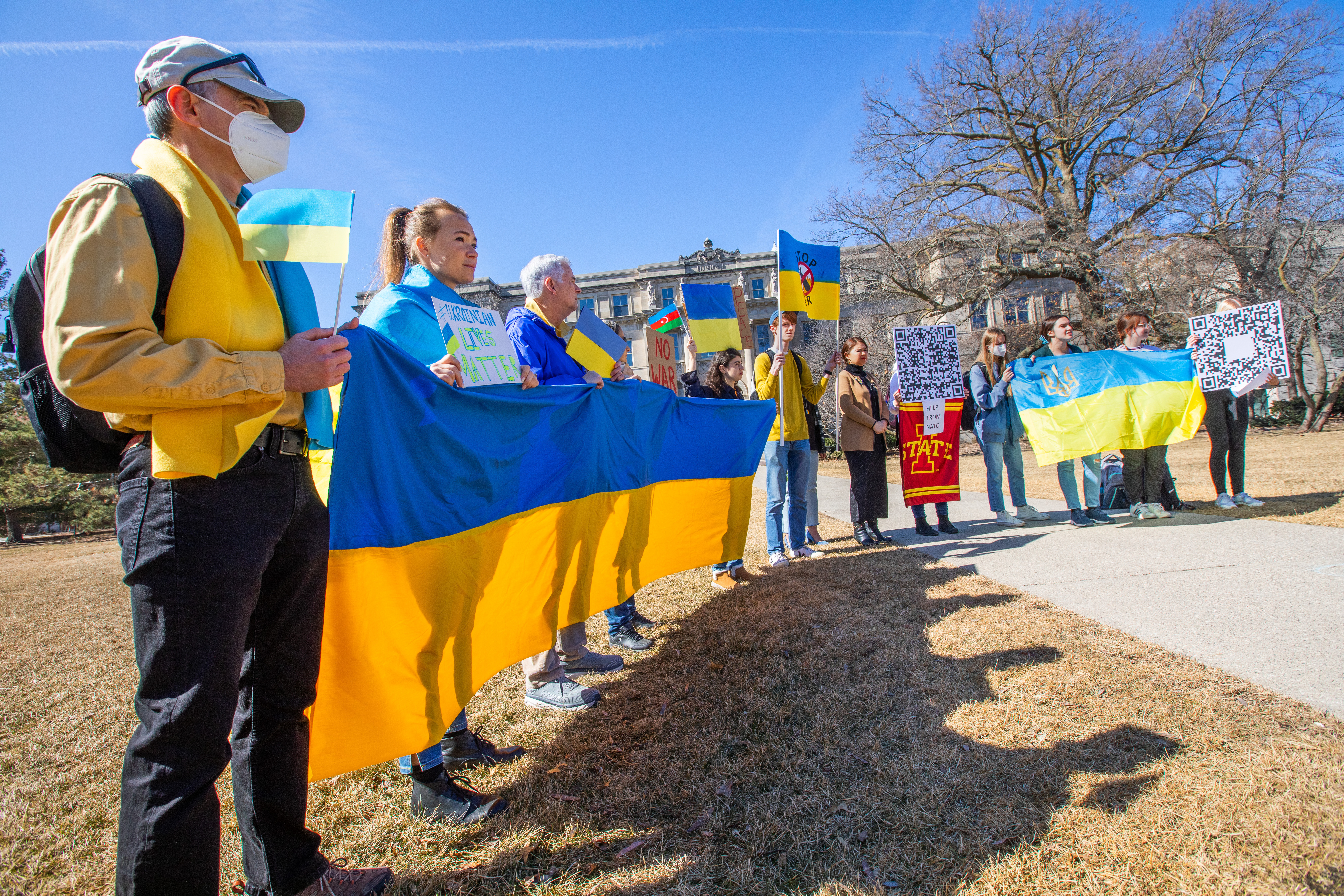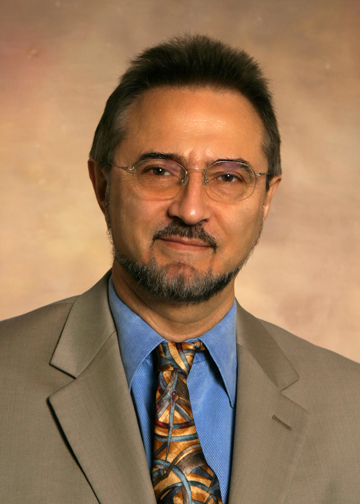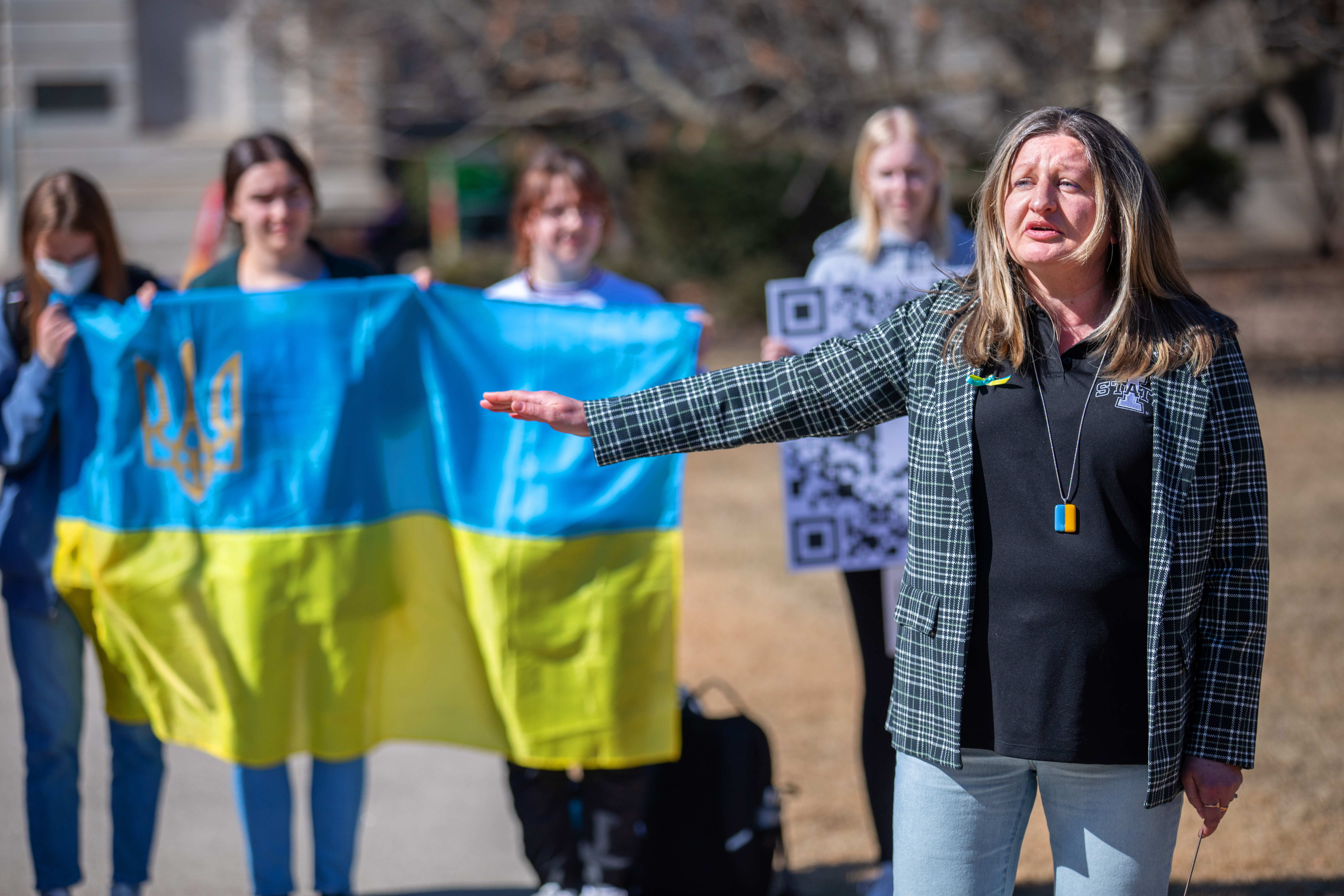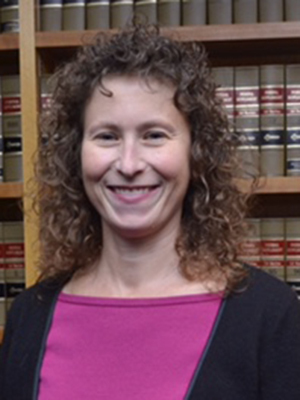ISU community reacts to alarming invasion of Ukraine

At a rally on central campus Wednesday afternoon, March 2, speakers voiced support for Ukraine and called for an end to the war. Photo by Christopher Gannon.
Last week's Russian invasion of Ukraine has left the Iowa State community shocked and saddened. The first large-scale land war in Europe since World War II has already claimed the lives of hundreds of civilians and soldiers.
While Iowa State currently has no students, faculty or staff in Ukraine, the university has long partnered with Ukrainian institutions to share knowledge, exchange students and collaborate on research projects. Others have ties to the region through study abroad programs and participation in programs like the Peace Corps.
"The war in Ukraine is a senseless and unprovoked tragedy that has already impacted the lives of millions of people," said President Wendy Wintersteen. "Our thoughts are with the Ukrainian people and with their loved ones in places like Ames. We wish them safety and freedom, as well as a peaceful end to this crisis."
Impacts of the war ripple across campus community
Wintersteen asked the campus community to offer an extra degree of care and compassion for colleagues from Ukraine and Eastern Europe and from all areas of the world where the threat of war is a daily concern. She also cautioned against prejudice or bias toward Russian students, faculty and staff, who are not responsible for the actions of Vladimir Putin's regime.
Risk management monitors travel to the region
The office of risk management (ORM) continues to monitor the safety of travel in the region. The university does not currently have any travelers in Ukraine, Russia or Belarus, and study abroad programs to Ukraine and Russia have been suspended until further notice.
Travel to neighboring nations also may pose a risk. ORM staff recommend avoiding nonessential travel to Estonia, Finland, Hungary, Latvia, Lithuania, Moldova, Poland, Romania, Slovakia and Sweden. Travelers currently in these locations have not been asked to leave but are encouraged to monitor the local news for developments that could impact their safety.
How to help
Anson Marston Distinguished Professor of Engineering Valery Levitas, originally from Kyiv, has many family members and friends still in the city. He reports his family spends sleepless days and nights in a small, self-made underground cellar, with space for only four chairs. Humanitarian aid is urgently needed.
"The food stores that can be reached are now empty and neighbors are sharing their remaining food," Levitas said. "Any amount of support can make a difference."
Individuals who wish to offer financial support to the Ukrainian people can do so in a variety of ways. Established international relief organizations include:
War is agony for those with loved ones in harm's way
Ukranians at Iowa State have watched in horror over the past week, checking in constantly with family and friends enduring the violence as Russian troops invaded and bombed their home country.

Valery Levitas
Valery Levitas, Anson Marston Distinguished Professor in Engineering and Vance Coffman Faculty Chair in aerospace engineering, was born and raised in Kyiv, where he received his doctorate and worked for more than a decade at a research institute. His hometown, the Ukrainian capital, has been a focal point of Russian attacks.
His wife's mother, sister and her sister's husband still live there, and Levitas has been calling and messaging them often. With each siren or alert warning of incoming missiles, they've taken cover in their root cellar, packing in with neighbors to wait out the explosions.
"They are in a relatively good situation compared to others who have already been hit," Levitas said. "There have been a lot of civilian casualties."
Lesya Hassall, instructional technology specialist with the Center for Excellence in Learning and Teaching, is from Ukraine but came to Iowa State in 2001 to pursue her doctorate and met her husband, "which changed my life from there." Hassall's father, mother, sister, brother-in-law and their family remain at home in western Ukraine on the border with Hungary.
"They are safer than the majority of the population, but I already know of one time when they were forced to go to the shelter because of a missile alert," she said.

Lesya Hassall, instructional technology specialist for the Center for Excellence in Learning and Teaching, speaks during a rally in support of Ukraine on March 2. Photo by Christopher Gannon.
Hassall is in touch with Svitlana Volodymyrivna Tezikova, her teacher and mentor and eventually a colleague at Nizhyn State Gogol University, about 60 miles northeast of Kyiv. The students cannot leave, so Tezikova, the head of the world languages and literature department, has had to shift from teacher to provider, making sure students have food and water.
She also talks with two friends in Chernihiv, about 60 miles north of Kyiv: Ivanna Lipatnikova, an English and German interpreter and teacher, and Anechka Beregova, a teacher.
"The fighting has been hard, so I spend my nights talking to my friends who are sitting in shelters, and their husbands are out on the front line," Hassall said. "They are sitting there and singing songs about peace, love and beauty. They asked me if I remember any more songs because they had gone through them and could not remember any more."
That is one of the most challenging things for Hassall, who said she feels empty inside, as she sits comfortably in her home talking with friends in Ukraine while hearing explosions in the background.
Levitas is worried for his family, who live near a dam and close enough to the Chernobyl nuclear power plant to be at risk if the site of nuclear reactor meltdown is attacked. Messages from his former colleagues in Kyiv and scenes of what's happening there are overwhelming, and he's angry to see Ukranians suffer. Resistance is a must, he said. But he also feels bad for his Russian friends who can't publicly oppose the war.
"They don’t have a chance to speak," he said.
At a rally held outside Parks Library on Wednesday, dozens of students, faculty and staff showed up to listen to speakers -- many of them ISU employees from Ukraine -- urge an end to the war and support for Ukranians under siege. Levitas said food is scarce in some areas and giving to humanitarian aid efforts will make a big difference.
"They need money, for food, for medical supplies, for everything," he said.
A related story in this Inside Iowa State recommends directing any donations to established international relief organizations, such as:
Ombuds service for employees returns in-house
Laura Smythe ("Sm-eye-th") has been named Iowa State's next university ombuds and will start in the post April 18. Smythe currently serves as university ombuds at the University of Idaho, Moscow. Since 2003, she has operated her own firm, consulting in organizational culture and conflict resolution and serving as a contract ombuds, and since 2013 also has provided training in mediation and communication skills for staff in the state of Wisconsin's Department of Health Services.

Smythe
"Laura has deep and extensive experience in the fields of mediation and conflict resolution. Her understanding of higher education and academic culture will allow her to hit the ground running at Iowa State," said Dawn Bratsch-Prince, associate provost for faculty who oversees the ombuds office.
"Those who met Laura during her campus interview commented on her thoughtfulness and ability to put others at ease, qualities that will serve her well in her ombuds role," she added.
Previously, Smythe worked in the University of Wisconsin system, including teaching undergraduate communication courses at the Green Bay campus and directing pro-bono programming for law students at the Madison campus. She served as executive director of the Mediation Center of Greater Green Bay and taught graduate and undergraduate online courses on topics from business law to organizational leadership, from the U.S. Constitution to conflict resolution, at the University of Phoenix and the former University of the Rockies. She also has worked as a private-practice attorney.
"I am excited to become a part of the Iowa State University family," Smythe said. "I was intrigued by the opportunity to work at an R1, land-grant university whose students speak so highly of their relationships with professors and their learning opportunities. I look forward to becoming part of such an innovative and dynamic campus and to contributing to a university culture of curiosity, respect and inclusivity. And I look forward to returning to the Midwest -- where I grew up and where my heart has always been."
Bringing the service in-house
Since August 2020, when the previous university ombuds retired, the university has contracted with Boston-based MWI, where two ombuds assisted Iowa State employees as they worked remotely, particularly during the pre-vaccine months of the COVID-19 pandemic. The response to the virtual service was immediate and positive, Bratsch-Prince said, and university leaders are very pleased with MWI's service. The plan always was to return to an in-house, in-person ombuds, she noted.
MWI's service will overlap for a short time after April 18 to ensure a smooth transition of cases. Initially, Smythe will work remotely from Idaho for several months and arrive on campus by July 1.
Smythe earned a doctorate in law (1997) and master's degrees in Latin American and Iberian studies (1992) and political science (1991) from the University of Wisconsin, Madison; and a bachelor's degree in Spanish (1990) from the College of Wooster, Ohio.
Iowa State's ombuds services are independent, neutral and confidential for faculty, P&S and merit staff, postdoctoral scholars, and graduate and professional students. They are an informal resource for employees, but are not meant to replace an employee's ability and responsibility to speak with their manager to informally resolve issues.
Three finalists named in EO director and Title IX coordinator search
Three finalists for Iowa State's director of equal opportunity and Title IX coordinator post will interview on campus this month. Each candidate's schedule includes a campus forum at 3 p.m. in the Memorial Union on the first day of their visit. The dates and room locations for the forums are:
- Candidate 1, March 8, Campanile Room
- Candidate 2, March 22, Cardinal Room
- Candidate 3, March 24, Campanile Room
Each finalist's name and curriculum vitae will be shared on the search website the day preceding their visit.
The forums will be recorded and available for later viewing on the search website. Everyone who participates in the campus forums is asked to complete an online feedback form for each candidate.
Associate provost for faculty Dawn Bratsch-Prince is leading a six-member search committee, assisted by the Spelman Johnson search firm. Mary Sirna, administrative advisor and attorney on staff for ISU police, has been serving as interim director of equal opportunity and Title IX coordinator since October, following the departure of Margo Foreman.
Related story
- Sirna named to equal opportunity interim leadership post, Oct. 21, 2021
Work continues on improving child care access
Progress has been made on many of the actions recommended by a task force that studied how to improve access to high-quality and affordable child care for Iowa State employees and students with children.
The task force started meeting in fall 2019, prompted by concerns raised in a campus climate survey. In fall 2020, the task force released a report identifying short-term and long-term recommendations for improving child care options in the Ames area. President Wendy Wintersteen approved proceeding with all of the recommendations.
Here's a recap of the progress, based on a recent report from university human resources (UHR):
Short term
Repurpose space: To increase capacity for the most in-demand type of child care in the area, the Comfort Zone was renovated to serve as space to care for infants and toddlers. The Comfort Zone had been a room in the University Childcare Center (UCC) devoted to caring for mildly ill children, but few parents used the service, which was becoming more difficult to staff even before it closed as the COVID-19 pandemic began. The renovation cost $117,000, about 36% paid for by a state grant, and the space was planned to open in fall 2021.
However, UCC has been unable to hire the additional staff needed to enroll children for the new space, due to a shortage of child care workers locally and nationwide. There's no timeline for when the new space will open, but recruitment is ongoing, said Cris Broshar, WorkLife and family services coordinator for UHR.
Allow flexible schedules: About 600 ISU staff participate in the new WorkFlex program, which allows employees to request adjustments in where, when and how they work, if it makes sense for their job duties and the university's mission. The task force had recommended promoting flexible schedules to make it easier for parents to attend to child care needs.
Boost student support: The task force suggested seeking funding to increase scholarship opportunities for student parents. Since the report's release, UHR has worked to connect student parents with financial needs to academic units to pursue completion grants, Broshar said.
Gather more data: Having more information about student parents helps connect them to resources and address their needs. For instance, a February 2020 survey of students found those who are parents cited time management and a feeling of isolation from campus as challenges, in addition to the availability and affordability of child care. Those responses helped drive the establishment of a family-friendly study room at Parks Library and networking events for student parents.
UHR has met with the Graduate College to discuss how to better collect data on student parents on a regular basis, perhaps upon acceptance to the university and each semester when they're registering for courses, Broshar said.
Long term
Increase student subsidy: Through contributions from the Story County Analysis of Social Services Team (ASSET), students are eligible for subsidized rates at UCC and the Ames Community Preschool Center. ISU Student Government allocations to Story County ASSET help fund the subsidies and have increased to about $117,000, up more than $21,000 since 2019.
Pursue partnerships: The task force report called for creating a permanent leadership committee to seek community partnerships to help build additional child care centers in the Ames community, potentially including the city, county, local businesses, schools and charitable groups. While the leadership committee hasn't formed yet, in part due to the time demands of responding to pandemic issues, ISU is vigorously pursuing the creation of additional child care centers, in collaboration with other area employers, the city of Ames and the Ames Chamber of Commerce.
Extension helps the state train child care professionals
One of the challenges in providing child care is having enough qualified people to staff centers and home operations. Since 2017, ISU Extension and Outreach has helped licensed and registered child care providers complete required training.
"In 2017, the federal government mandated that all child care providers have pre-service training before they can begin working with children," said Lesia Oesterreich, extension early childhood programs state specialist. "[The training] focuses on health and safety issues and brought consistency to those areas."
Working with the state departments of Human Services and Public Health, extension developed training centered on child care and early childhood education. The result is thousands of Iowans becoming certified and able to work. In the fiscal year that ended last June, extension issued more than 86,000 training certificates to early childhood education professionals across the state, down slightly from previous years because of the pandemic, Oesterreich said.
Training and professional development
Extension offers required training and professional development programs. Most of the certificates were issued in the two mandatory programs:
- 68,000 certificates: Essentials Child Care, 12 hours divided into 12 modules, ranging from "Safety in Your Child Care Environment" to "Managing Food Allergies." Participants must score 80% on a quiz for each module to receive their certificate.
- 15,000 certificates: Universal Precautions focuses on infectious disease control and health basics such as proper hand washing, something reinforced worldwide since the start of the pandemic.
Three other programs that help child care providers and improve settings for children saw significant interest:
- 1,200 certificates: Passport to Early Childhood Education, a 15-hour program launched during the pandemic and designed as a workforce entry program. The program demonstrates and explains the "how" and "why" behind quality care and teaching. Oesterreich said this training is intended to prevent turnover and stabilize the workforce by giving providers confidence in their work.
- 1,000 certificates: Iowa Early Learning Standards focuses on developmentally appropriate activities and lesson plans.
- 500 certificates: Environment Rating Scale Training helps providers self-assess the quality of their child care program and create a program improvement plan. They then have the option to request a formal outside assessment of their program that can lead to a 1-5 quality rating score, much like hotels and restaurants use. This rating helps market their child care program to families and can help them earn financial bonuses from the state.
Extension's remaining programs are designed as professional development for providers who live or work in the state. Oesterreich said extension issued about 1,000 certificates in this area, and professionals from as far away as Texas take part in training that may not be offered where they live. Nearly all training is free through funding partners.
Online shift
Oesterreich said extension has conducted child care training for at least 45 years, but recently made it available 24/7 statewide and self-paced. Prior to an online option, new hires sometimes waited months and drove long distances to attend in-person training.
The online training was invaluable during the pandemic with professionals able to earn their certification without having to put themselves or others at risk.
The programs are structured through numerous video lessons -- similar to YouTube -- that allow participants to learn by seeing best practices being put to use.
"New staff are able to watch and rewatch them to really see good models of practice," Oesterreich said. "These are young children, so it really helps to learn how to talk to and teach them."
Participants receive a certificate after completing training, and results are recorded in the state's I-PoWeR workforce registry. When child care teachers and home providers complete training, ISU sends that information to the registry, acting as a system of checks and balances, Oesterreich said.
